#megan derr

Megan Derr is the co-owner of Less Than Three Press, an indie LGBTQ publishing house–and she’s also their most prolific author. Before LT3’s founding, Megan posted her slash fiction on LiveJournal and Fictionpress, epicenters of older wank that unfortunately went unrecorded.
Over the years, Megan has been embroiled in several dramas, none of which impeded LT3’s growth. When juxtaposed with similar controversies, this lack of fallout becomes curious.
Was she just Not That Bad, comparatively? Did people not care? Or had Megan’s navigation of the drama de-escalate any chance at a larger blow up? We investigate.
Why does Megan matter?
As visible co-owner of a successful and award-winning LGBTQ press, Megan is officially a gatekeeper. Her personal opinions matter and her voice reflects on her business… theoretically. Of course, in the past Megan has implied she was a martyr for the community, working so hard for them, whilst neatly minimising that her profit also comes from that same community
Nonetheless, she has a direct hand in what gets published, which is her right as co-owner. LT3 proactively publishes trans, bi, ace, and other less-exposed areas of the queer spectrum.
While this is obviously wonderful in a lot of ways, LT3’s prominence in this particular publishing sphere becomes concerning when you realize that Megan Derr’s personal beliefs and ethics drive the majority of the publishing decisions, and thus, what representation is produced. Given her avowed dislike of #OwnVoices (which will be expanded upon further in this report) and her insistence that the subject of a genre is not the audience for that genre, the implications are troubling.
We posit that Megan skirts the line of actionable offences, but works to “poison the well” or create a toxic environment. This is more ephemeral than other infamous instances of wank, but it is a long-running pattern of behavior with real consequences for both individuals and the community as a whole.
Social Media Climate
Recently, we compiled reports on Santino Hassell and Riptide Press, the latter of whom is still attracting attention for bad decisions.
Social media is primed for another explosion. The match was lit when the Bi Book Award finalists were announced and several Twitter users took umbrage with the two competing publishers of the year: Riptide Publishing and Less Than Three Press.
The current call out
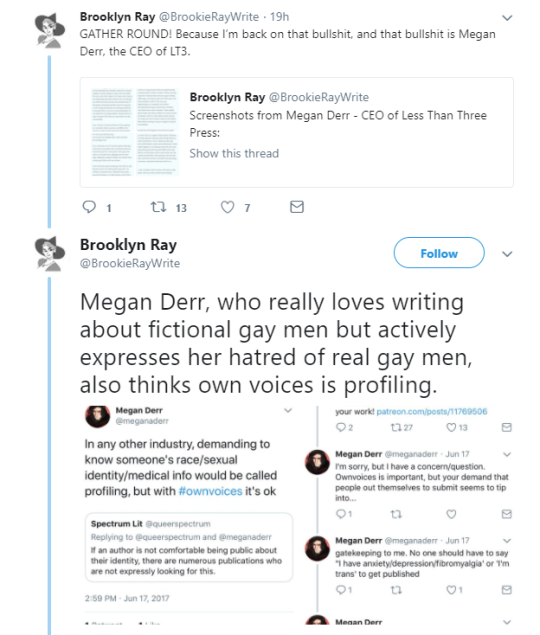
Twitter user BrookieRayWrite reacted to the Bi Award announcement with a threaded post, which included screenshots of Megan’s past behaviour. They referenced two incidents: Megan’s dislike of #OwnVoices—a movement in publishing to uplift authentic minority experiences so that people could find content they felt connected to—and her blog post declaring M/M is for women.
However, this was not the first time someone tried to call out Megan. Heidi Belleau, an author LGBTQ romance, posted a comprehensive thread in 2016.
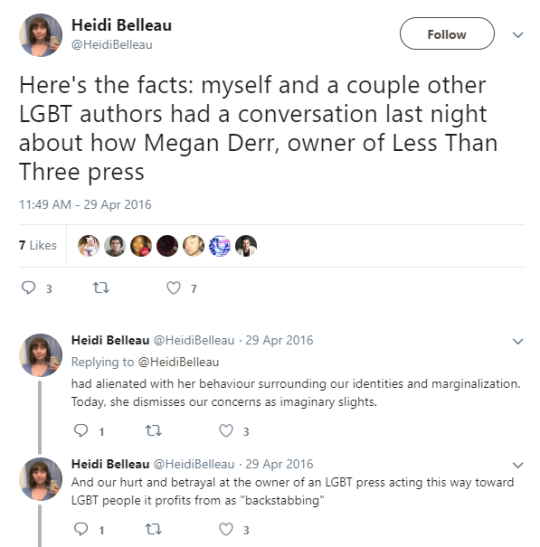
The rest of which, can be found here.
Nothing came from this Twitter call out. But now Heidi has resurfaced with her complaints about Megan, and with her comes an old wank standby to defend Megan–Aleksandr Voinov.

Yep. He called her crazy. In case you missed it, Heidi Belleau takes on this moniker to analyze its silencing and delegitimizing function. In short, Voinov is not only being ableist, he is actively working to create a hostile landscape to voices critical of Megan Derr.
Moments of Note
“No Gay Aces”
In an incident that went unrecorded, but that we witnessed at the time, an author published a book with a character who identified as “gay ace.” Incensed, Megan declared that there was no such thing. This conflict is worthy of note because its exemplifies Megan’s confidence in her own rightness and her refusal to ever back down from a position, a character trait that shines through in following events.
However, perhaps it also showcases Megan’s reaction when she knows she’s incorrect—as of now, the conflict seems to have been scrubbed from GoodReads. We hesitate to include unsupported facts, but feel it is important in Megan Derr’s case to establish her pattern of behavior, in order to examine her tactics and strategy.
“Rose Lemberg”
At the height of #OwnVoices, Megan was becoming increasingly irritated over what she interpreted as a movement to outlaw people writing outside of their identity. She replied to a Tweet by Rose Lemberg—
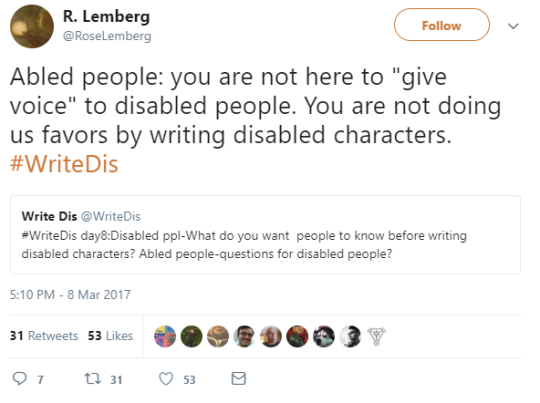

Apparently Megan needed a reaction, because she Tweeted at Rose twice.
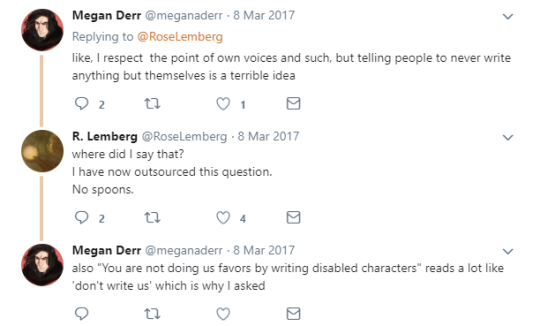
Megan’s interpretation of “you are not doing us a favor,” as “don’t do this,” has the unfortunate implication that she believes writing outside of her identity is doing someone a favor.
When Rose removed themself from the conversation, Megan reacted thusly:
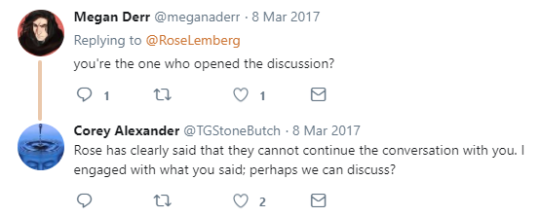
She steamrolls over Rose’s “no spoons” comment, a clear signal in the disabled community that further engagement would be literally damaging to the respondent. The fact that she ignores that signal is incredibly ableist—and if she’s ignorant about that, it just shows how unprepared she is to write disabled characters, thus proving Rose’s point.
After confronting Rose, and not getting the response she wanted, Megan unfollowed.

Megan apologized for misgendering Rose, and we do not believe she would intentionally misgender someone. However, it does illustrate her “shoot first” nature.
“M/M Is for Women”

Turnabout is fair play, in a sense, because Megan had her own opportunity to open a discussion and then immediately block responses to it.
Megan lobbed quite the cannonball across the community’s bow with this fascinating retort against white cis gay men, prompted by a gay man who had called out the M/M genre for its fetishism of its subjects. Out of all her altercations, this one may be the most ill-advised (in a PR sense). It is also one where she found her audience not only unreceptive, but actively accusatory.
Whatever her point may have been, Megan said M/M wasn’t for gay men. Yes, Yaoi, BL, and slash fic was, on the surface level, fueled initially by a female audience. Yes, they fall under different genre conventions than the works of EM Forster and other literary authors. But there’s something undeniably and offensively entitled about declaring ownership of a genre over the actual subject of that genre.
When Megan felt that people were ignoring her reasoning unfairly, she shut down comments.
Friend/Colleague Exodus
If one were to casually take note of the comings and goings of Megan’s friends and colleagues, they may notice a gradual change in the cast of characters. The common denominator of this situation, of course, is Megan. There is a track record of Megan and her sister, Sam, saying oddly misguided and downright offensive comments to their authors, usually trans authors, at which point the relationship is ended and the author quietly moves on.
Water off a duck’s back
People in Megan’s sphere have probably noted that, controversy after controversy, nothing sticks. Even after years of wanky drama all throughout M/M’s history, with the inevitable apologies and flounces from the authors and readers at the center of each crisis, Megan keeps on trucking. The question is, what makes her different?
Leaving the realm of screenshots and facts, there’s only theory to go on. For instance, maybe the conflicts Megan faces are small enough, and far enough apart, that no one can exactly put into words why they think she should be called out. Or perhaps the people who dislike her realize some hypocrisy would come with accusing her of something. (Those in glass houses, etc.)
From a more practical angle, she almost never apologizes. Typically, the subjects of wank quibble, apologize several times, and release statements. Megan usually just posts a few accusatory tweets and then moves on after blocking anyone who could possibly question her worldview.
As evidenced by the more recent wanks, there is generally tangible evidence of harm with multiple victims stepping forward to detail their abuse. However, this takes years and momentum for this to occur. We know that Megan has her share of victims as well, and we know that they have experienced mental and emotional harm that has had real impact on their ability to work. Yet if people were to inspect why they don’t like her, would they only find several blog posts and Tweets that are abrasive and tone-deaf?
Her Modus Operandi has always been to aggressively confront someone she disagrees with (ex. Rose Lemberg) and then flounce/block when she’s challenged. Mirroring that, when someone confronts or disagrees with her, she immediately shuts down discussion (ex. M/M is for Women blog post).
As the co-owner of LT3, she also partly controls the narrative of indie LGBTQ publishing. Her choices and attitude influence the community tone and acceptable in-group culture, and, arguably, add toxicity. However, to pin down specific instances (and therefore confront and address them), is incredibly difficult—which is possibly why every call out thus far has dwindled without fanfare.
In Summation
The overarching, and fascinating, truth about Megan is sometimes she makes sense. Unfortunately, she also says a lot of bullshit. This may come from a lack of ability to grasp nuance.
Does #OwnVoices put pressure on people to out their life circumstances for the sake of credibility? Probably, yes. But others feel confident in self-reporting, wanting their voices out there for others to hear them. Do people mispronounce white people’s names? Yes. But that doesn’t negate the racist undertones and microaggressions minorities face when people mock their names. These, among other situations, are odd hills Megan chooses to die on seemingly because she doesn’t want to understand them.
The current call out is in reaction to the Bi Awards. Certain authors have stepped forward to Tweet their protest of LT3’s nomination. They argue that Megan, as the owner of LT3, has promoted an environment that does harm to bi voices, and they feel it is inappropriate for her to be celebrated in this specific context.
The situation is still developing. From here, we can see only two branching paths. Either those running the Bi Awards rescind LT3’s nomination, or they do not.
But this event is dredging up old salt. As with any wank, one is left wondering what the conclusion should be; Exile? Apology? Loss of sales? What does a successful call out look like? Megan is a real person with a wife and a business that she has worked hard to develop. She publishes minority representation because she believes in that effort.
But her belief does not exculpate her.
She has managed to repeatedly dodge accountability. Whether this is through calculated tactics or a magical formula she managed to stumble upon doesn’t change the fact that she has actively contributed to making the community hostile to marginalized people. It doesn’t change the fact that her status as a major publisher among LGBTQIA online presses shields her, especially as those who would ordinarily call her out for bad behavior must hesitate and consider the economic ramifications of doing so.
Now, to guess what Megan might pull from this to deflect responding to the salient points? Probably that we mentioned her mom voted for Trump.
Interesting links:
Heidi
Maria_Reads
